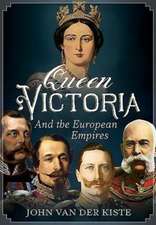Religion and Racial Progress in Twentieth-Century Britain: Bishop Barnes of Birmingham
Autor Patrick T. Merricksen Limba Engleză Hardback – 20 iul 2017
| Toate formatele și edițiile | Preț | Express |
|---|---|---|
| Paperback (1) | 327.45 lei 38-44 zile | |
| Springer International Publishing – aug 2018 | 327.45 lei 38-44 zile | |
| Hardback (1) | 394.87 lei 6-8 săpt. | |
| Springer International Publishing – 20 iul 2017 | 394.87 lei 6-8 săpt. |
Preț: 394.87 lei
Nou
Puncte Express: 592
Preț estimativ în valută:
75.56€ • 79.10$ • 62.52£
75.56€ • 79.10$ • 62.52£
Carte tipărită la comandă
Livrare economică 05-19 aprilie
Preluare comenzi: 021 569.72.76
Specificații
ISBN-13: 9783319539874
ISBN-10: 3319539876
Pagini: 250
Ilustrații: IX, 250 p. 4 illus., 1 illus. in color.
Dimensiuni: 148 x 210 mm
Greutate: 0.58 kg
Ediția:1st ed. 2017
Editura: Springer International Publishing
Colecția Palgrave Macmillan
Locul publicării:Cham, Switzerland
ISBN-10: 3319539876
Pagini: 250
Ilustrații: IX, 250 p. 4 illus., 1 illus. in color.
Dimensiuni: 148 x 210 mm
Greutate: 0.58 kg
Ediția:1st ed. 2017
Editura: Springer International Publishing
Colecția Palgrave Macmillan
Locul publicării:Cham, Switzerland
Cuprins
1 Introduction.- 2 Anglican Modernism.- 3 Heredity and Race.- 4 The Eugenic Philosophy.- 5 Negative Eugenics.- 6 Conclusion.
Notă biografică
Patrick T. Merricks is Lecturer in modern history, Director of the Working Group in the History of Race and Eugenics and Research Fellow of the Centre for Medical Humanities at Oxford Brookes University, UK.
Textul de pe ultima copertă
This book is the first in-depth analysis of Ernest William Barnes’ Christian-eugenic philosophy: ‘bio-spiritual determinism’. As a testament to the popularity of the movement, mid-twentieth century British eugenics is contextualized within a remarkably diverse selection of discourses including secular and Anglican interpretations of modernism, poverty, population, gender equality, pacifism and racism. This begins to address the scholastic gap on Christian eugenics while highlighting the perseverance of eugenic racism after World War Two.
Caracteristici
Examines the relationship between religion and eugenics in light of the wider political, moral and scientific debates of the early twentieth century Offers a detailed assessment of a significant figure in the history of British eugenics Considers the importance of eugenics within national discourses during this period Includes supplementary material: sn.pub/extras








